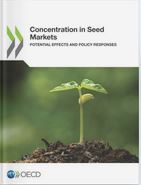 Topics Topics |
|
|
|
 Species Species |
|
|
|
|
|
Kenya - Big win for sorghum farmers
Kenya
June 22, 2015
The Kenyan Government’s decision to impose a 50 per cent levy on the sale of sorghum-based beer saw the country’s sorghum market collapse, resulting in farmers struggling to find alternative markets for the once profitable crop.
Often the first things that come to mind when people talk about the challenges smallholder farmers face are issues around the access to quality seed, inputs and storage, but what this story shows is that often it is decisions made far away the farm gate that can have the biggest impact on farmer livelihoods.
A recently imposed 50 per cent excise tax on beer made from sorghum saw product sales drop by 75 per cent, and left thousands of smallholder farmers in Kenya without a market for their grain, when the largest buyer – East African Breweries Limited (EABL), a Kenyan subsidiary of Diageo – cancelled the contracts it held with farmers.
However, a coordinated effort by stakeholders along the sorghum value chain has seen the government review its decision, which was crippling Kenya’s sorghum industry.
The beer in question – Senator® beer – was popular with Kenya’s low-income market as it gave them an affordable alternative to the illicit and, sometimes deadly, local brews.
At KES 30 (US $ 0.30) a glass, the brand spelt good news for farmers, the manufacturer, retailers and consumers.
And as sales for the beer took off, so did demand for sorghum.
The entry of EABL into the market saw sorghum prices rise by 500 per cent, from KES 5 (US$ 0.05) per kilo to KES 27 ($0.30).
To keep up with the demand, farmers took out loans for seed and inputs to increase production and to ensure supply, EABL signed contracts with 26,000 farmers.
It was good business for smallholder farmers as they were making more than they had with other crops, like maize.
This development also affirmed years of investment in the sorghum value chain by various actors including the Kenyan government, development partners, research institutes, cereal grower associations and market development experts. Analysts pegged these investments at US $ 100 million over more than 10 years.
However, the introduction of a 50 per cent excise duty on sorghum-based beers sent a shockwave through the value chain.
First Senator ® beer prices nearly doubled to KES 45-50 (US$ 0.50-0.56), as the excise duty was passed onto consumers, and as prices rose, drinkers looked for alternatives.
Next, over 300 outlets selling the beer closed due to low sales, which had fallen by as much as 75 per cent.
Lastly, for farmers the fall in demand saw sorghum farm-gate prices drop by 80 per cent. Additionally, the brewery cancelled its contracts with the growers.
AGRA’s Director for Market Access Program, Anne Mbaabu, said the sorghum excise is a good example of how government policies can be counterproductive.
“What we saw with the sorghum excise was a poorly thought out tax that was stifling the market and killing production.
“The government had hoped to raise US$ 68 million through the excise, but instead demand for beer fell, which left both farmers and consumers worse off,” Ms Mbaabu said.
With the largest buyer of sorghum now pulling out of the market, AGRA grantee the Cereal Growers Association (CGA) initiated a campaign to have the Government reconsider its decision.
CGA brought a number of stakeholders together, including the East African Grain Council and EABL to highlight the impact the sorghum excise was having on the agricultural value chain.
Together they initiated a campaign, which involved stakeholder meetings, stories in major daily newspapers and surveys conducted among sorghum farmers on the impact of the new tax on their operations.
Economic policy think tank, Tegemeo Institute undertook a study on the impact of the tax on the entire sorghum value chain.
Tegemeo’s report showed that farmers, transporters and other players in the sorghum value chain lost KES 258 million (US$ 2.66m) in foregone revenues because of the excise duty.
In a win for CGA’s efforts and smallholder farmers, in May, Kenya’s President, Uhuru Kenyatta, signed into law an amendment, which grants remission of the sorghum beer excise duty at 90 per cent.
At the time the law was signed, the brewery confirmed that it would reconsider renewing its contracts with sorghum farmers.
Said Ms Mbaabu: “This story has been a great win for smallholder farmers, who have managed to maintain their market, but it shows the importance of strong farmer organizations.
“Not only are CGA providing training and services to their members, but they have shown they have the capacity to organize and execute successful advocacy campaigns to strengthen the business of farming.
“That is a success story in itself,” Ms Mbaabu said.
More news from: AGRA (Alliance for a Green Revolution in Africa)
Website: http://www.agra-alliance.org Published: June 22, 2015 |
|
|
|
Better Food Venture's
AgTech Landscape 2019

|
| |
|
2019 THRIVE Top 50
landscape map

|
| |
|
Concentration in Seed Markets - Potential Effects and Policy Responses

(OECD December 2018)
|
|
Visualizing Consolidation
in the Global Seed Industry
1996–2018

Seed Industry Structure
1996-2018
Phil Howard
Associate Professor
Michigan State University
|
|
2017 Seed Company Family Tree
Ccreated Septebmer 2017
by Robert Walsh
WaSoo Farm, Elk Point, South Dakota |
 |
Syngenta Brands Family Tree
Ccreated January 2017 by Robert Walsh, WaSoo Farm, Elk Point, South Dakota
|
 |
| |
Rabobank's
World Vegetable Map 2018 |
 |
|
|